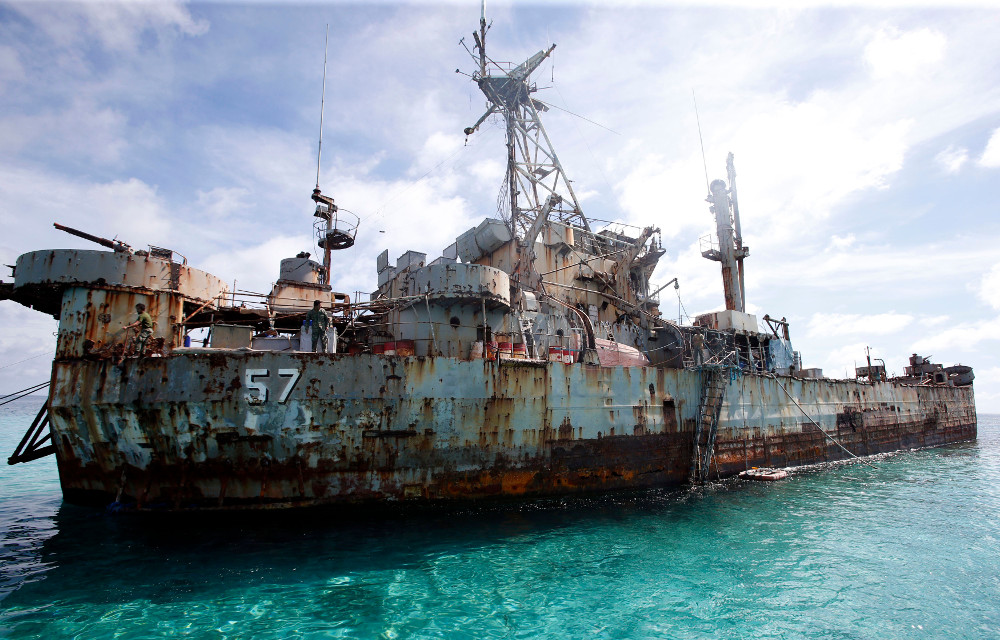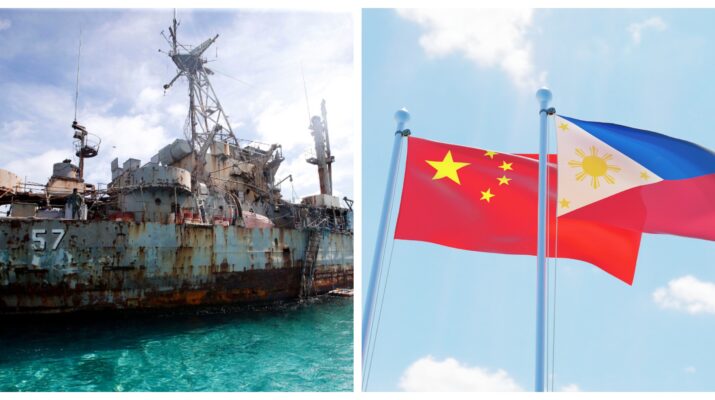Tensions in the West Philippine Sea have escalated to new heights this month, after members of the Chinese Coast Guard (CCG) attacked Philippine Navy (PN) personnel on their way to resupply the BRP Sierra Madre – a naval ship ran aground in the Ayungin Shoal, part of the Kalayaan Island Group (KIG).
Two PN rubber boats had approached the Sierra Madre bringing fresh humanitarian supplies to soldiers stationed on the outpost, when CCG members on speedboats blocked them, boarded their rubber boats, and attacked the Filipino navy personnel on board with axes and machetes. The skirmish led to a member of the PN losing a thumb after being attacked with a machete by the marauding CCG.
Chinese forces also seized the PN’s rubber boats and their firearms, in a move that Beijing justified as a response to “the Philippine navy illegally breaking into the sea near Ren’ai Reef in China’s Nansha Islands” – their own respective names for the Ayungin Shoal and the Kalayaan Island Group. This despite both the BRP Sierra Madre and Ayungin Shoal falling within the Philippines’ internationally-recognized exclusive economic zone (EEZ).
[WARNING: SENSITIVE NEWS STORY]
EXCLUSIVE: A Filipino Navy personnel gets his finger cut off in a melee between Chinese and Philippine vessels in a resupply mission in Ayungin Shoal, June 17, 2024.
Six others were injured, and sources tell GMA Integrated News, China also seized… pic.twitter.com/TW1c509de8
— GMA Integrated News (@gmanews) June 18, 2024
The issue of resupplying and reinforcing the BRP Sierra Madre has become a flashpoint in the ongoing tensions between the Philippines and the People’s Republic of China (PRC) in the Indo-Pacific. The dilapidated naval vessel was grounded on Ayungin Shoal in 1999 to counter the growing number of Chinese outposts being built in the nearby Mischief Reef – at risk that the PRC would also gain control over Ayungin Shoal eventually.
It was no imagined threat; Beijing claims the submerged reef as part of its territory, despite being almost 2,000 nautical miles away from mainland China and less than 200 nautical miles away from the Philippines – well within the latter’s EEZ entitled to it under international law. This fact alone guarantees that Philippine
Since the ship’s grounding, units of the Philippine Navy have taken turns manning the Sierra Madre to ensure the Philippines’ presence in Ayungin Shoal – much to Beijing’s chagrin. The PN personnel are sustained by resupply and reinforcement missions, also called rotation and reprovisioning missions (RORE), which delivers fresh provisions of food, water and other essential supplies to the naval contingent onboard the ship.
These supplies are critical humanitarian provisions, yet the PRC regards these ROREs as “acts of aggression”. The CCG also hinder these humanitarian resupply missions by deliberately seizing the provisions that are delivered to the Sierra Madre.

Beijing also protests at the Philippine Navy’s attempts to repair and reinforce the BRP Sierra Madre, which – being a World War II-era ship – is in a decrepit state in need of constant repairs. Given the vessel also serves as the living quarters of the PN personnel stationed there, such reinforcements have a humanitarian purpose rather than a militaristic one.
Occasionally, PN RORE missions include the maintenance and repair of the Sierra Madre structure itself but this should not be regarded as a provocation given its humanitarian nature, and again, since the vessel falls within the Philippines’ EEZ. The Philippines has sovereign rights over Ayungin Shoal and the Sierra Madre grounded on it, thus the Navy has every right to reinforce the ship regardless of Beijing’s sentiments.
Given the facts, the Philippines has done nothing to warrant the violent attacks that the PRC have launched against its Navy personnel. Rather than be seen as a “geopolitical chess match” in the Indo-Pacific, as what most international media have reported, the recent escalation in attacks by the PRC and its CCG should be seen as Chinese aggression against the Philippines in our own West Philippine Sea.
Beijing’s actions should also not just be seen as a threat to the Philippines. After all, if it is claiming seas thousands of miles away from its own mainland then these maritime claims by the PRC also have the ability to hinder global trade by militarizing the crucial Indo-Pacific sea link.

